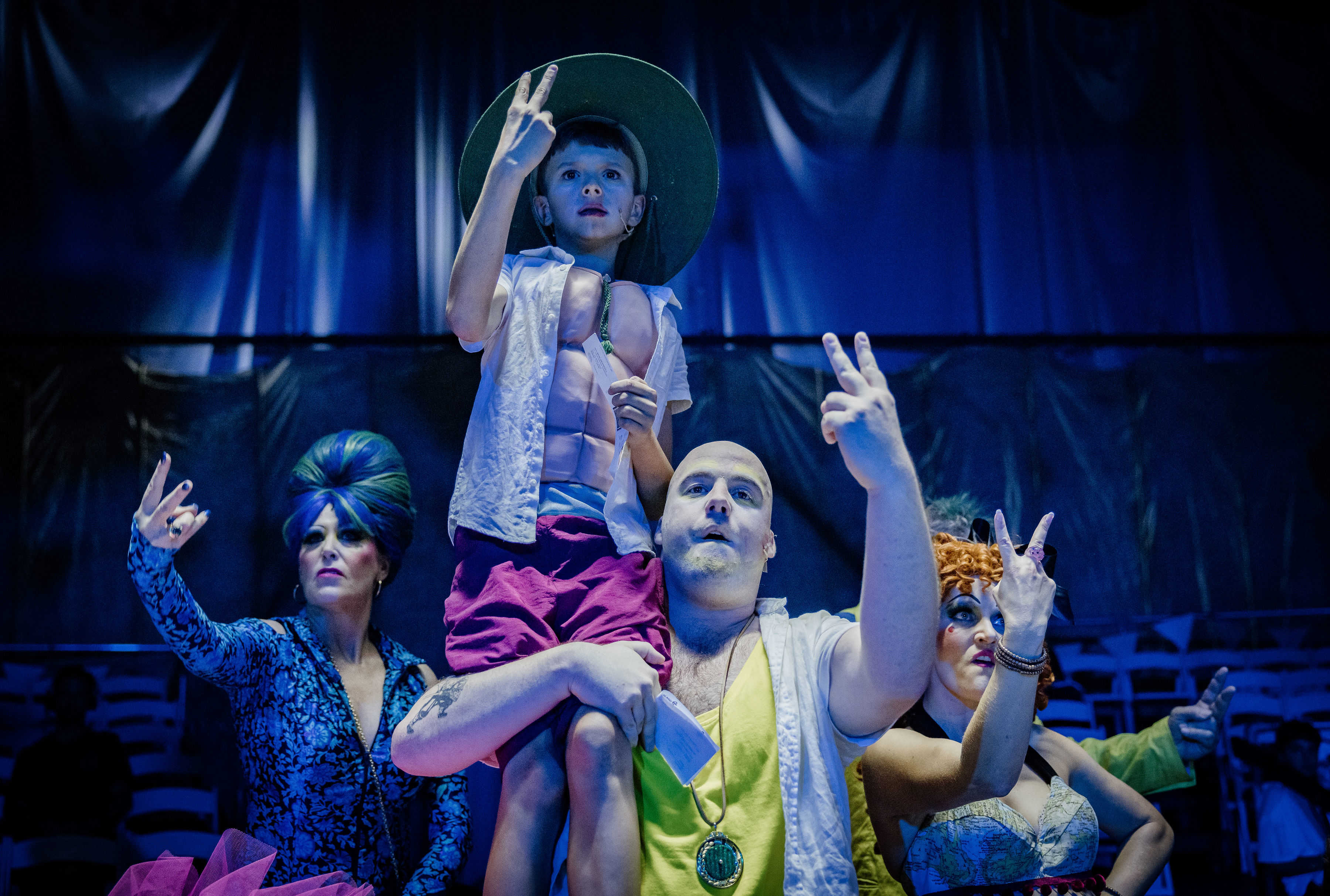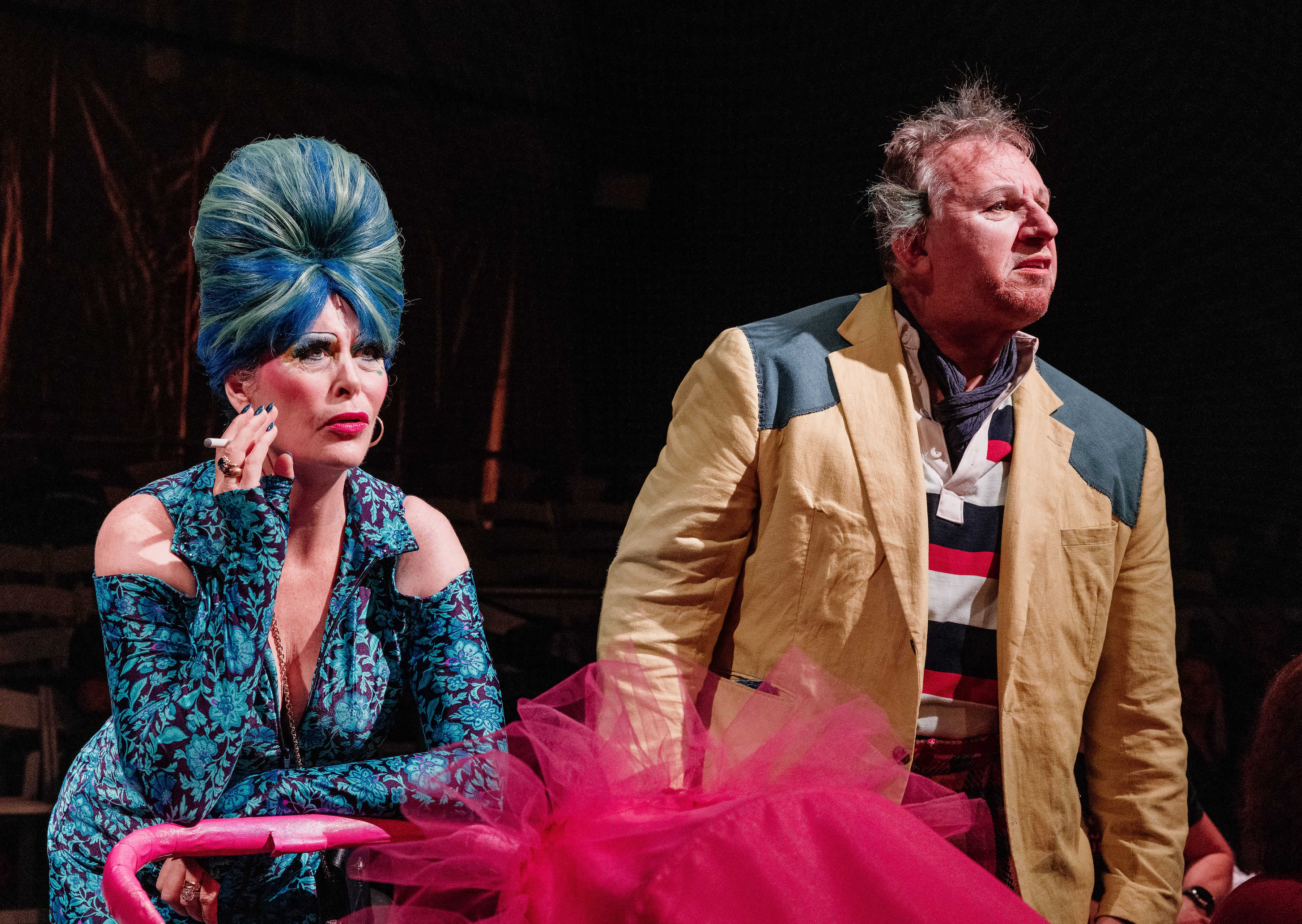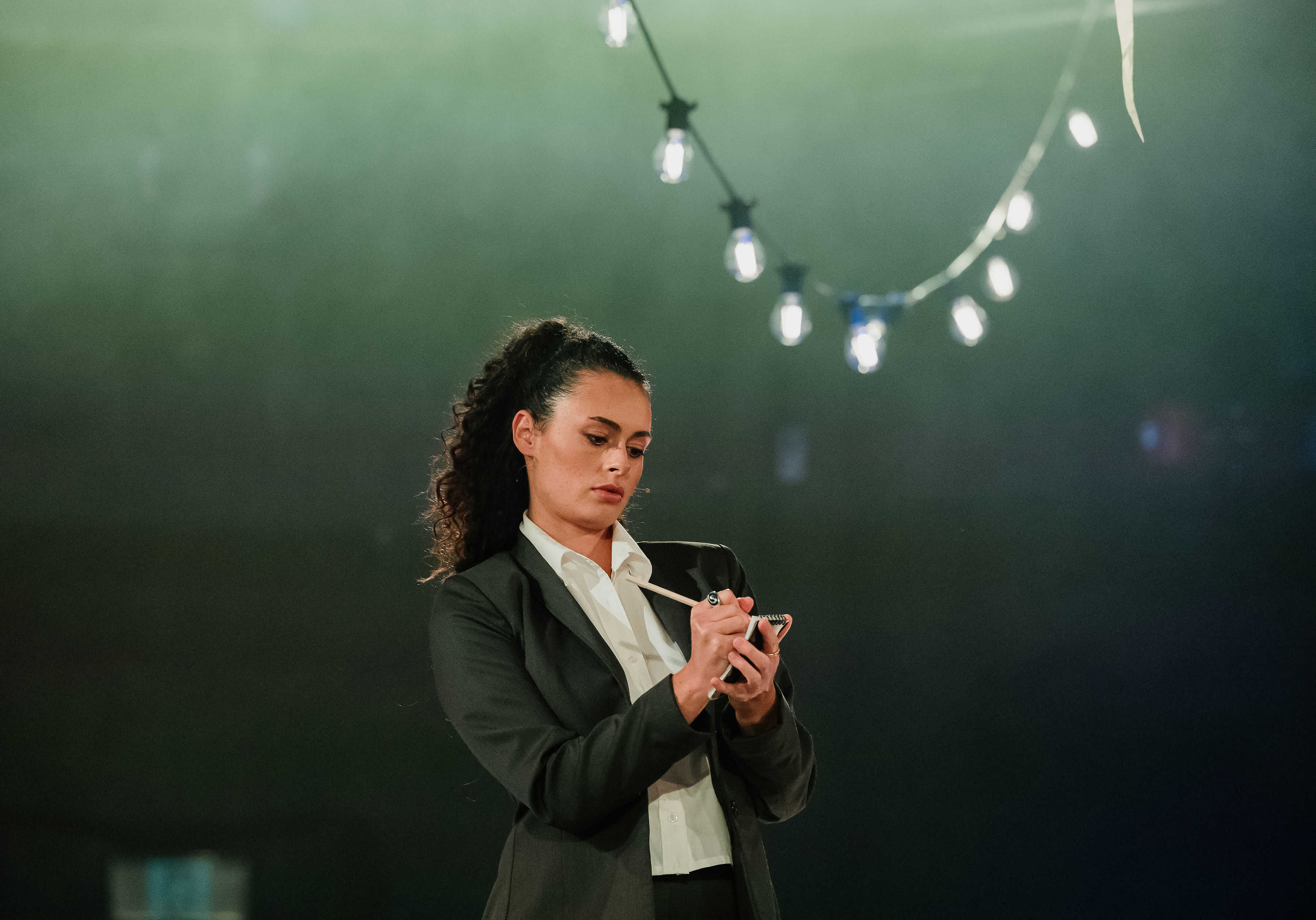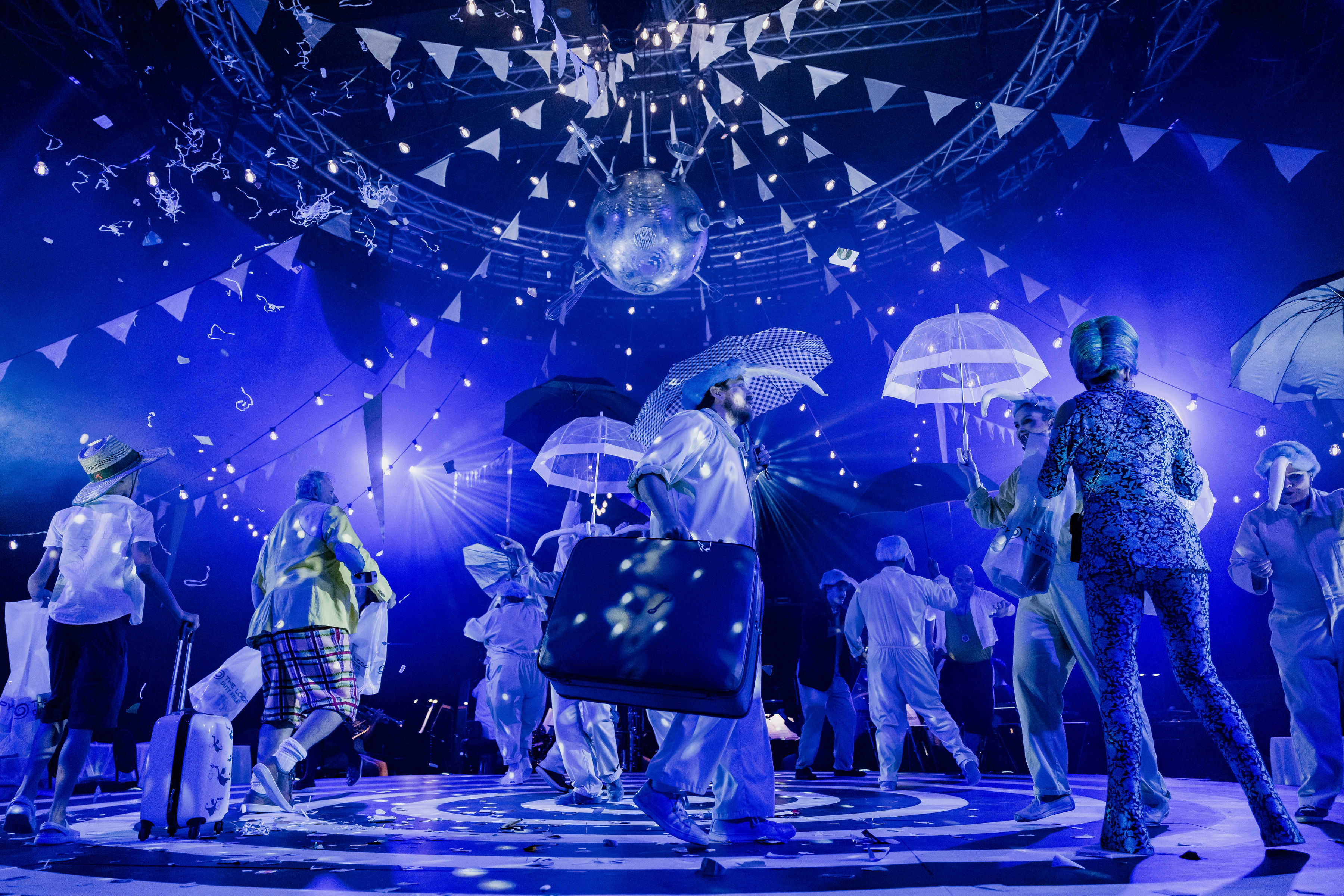TUT-TUT!
Eve de Castro-Robinson
“Enough, enough, my friends!
Your grief increases my own!
Scatter purple flowers,
place garlands on her tomb,
and leave me!”
Having just attended the premiere of (m)Orpheus, another NZ Opera production following March’s The Unruly Tourists, I’m freshly impressed with the company’s commitment to adventurousness, and engagement with this country’s culture. (m)Orpheus was a mesmerising dance-opera collaboration with Aotearoa’s Black Grace Dance Company. Māori and Pasifika dancers and chorus melded seamlessly on stage to present Greek tragedy in a rich retelling, deeply moving in its dignity and integrity. Any misgivings that the translation between Gluck’s 1762 work, and Neil Ieremia’s creation might prove clunky, was dispelled by the unity and geniality of the cast, whose serene beauty, strong voices, and luscious moves lit up the auditorium.
(m)Orpheus was the brainchild of the erstwhile General Director, the theatrically-monikered Thomas de Mallet-Burgess, as was The Unruly Tourists (henceforth TUT), presented finally in March after Covid delays. de Mallet-Burgess’s TUT opened very promisingly, with central character Manaia—be-suited, and lit at the back of the stage—delivering a powerful karanga. Would that this dignity had featured more strongly in the ensuing production, which soon became a bicker-fest targeted squarely at the mainstream.
“They’re a threat to all our Kinder
I need to call Jacinda.”
The rather twee venture was “written for dickheads” as candidly stated by its librettists Livi Reihana and Amanda Kennedy. Its widespread, shouty billing (“Knock your brains out”) as well as an ironically well-timed walkout by three esteemed members of the NZ Opera Board, ensured safely large audiences. The poster of a sneery kid with a two-finger salute seemed to draw the kind of conservative New Zealanders who want to laugh at behaviours they wouldn’t dream of permitting in their own homes. Despite the middle-aged audience around me chuckling their collective head off at the merest hint of a profanity, I often found myself churlishly solemn.
“Do you have any motherfucking fruit in your bag?
Don’t shoot, we don’t eat fruit.”
As this year’s most talked about (read: ‘advertised’) NZ Opera production, the qualities of risk, connection, and provocation practically fell over themselves in a desire to connect. “A piece of commissioning genius... there has already been more hype and interest in The Unruly Tourists than anything New Zealand Opera has done in years” shrilled one rightwing radio network. It was true enough—TUT was funny, extremely fast-paced, and full of local colour—but I had reservations. These were nothing to do with its branding as opera, which had others so worked up. Characters singing a story onstage? That’s opera, tick. Why be precious?
One issue in making an opera out of a merely chortle-worthy, briefly topical story without realising that such topics get stale very quickly, didn’t seem to have been thought through. Which of us had those hapless yobbos in our minds after they’d left our shores? That was the first hurdle. Secondly, complete lack of knowledge about opera by the librettists wouldn’t seem to be a promising start to the birth of a new one, and NZ Opera chose to task the pair behind The Fan Brigade (Reihana and Kennedy) with providing the text. Poetic it was not: the show romped along energetically in search of deeper meaning and weightiness.
”What about a piece on domestic violence?
This is not the Spinoff.”
The selection of the duo was pretty successful, their self-confessed clean slate on opera and its workings playing to their advantage with a libretto often fizzing with wit and local commentary,
”I want to write stories, I want to be the next Carol Hirschfeld, Mihingarangi Forbes, or Heather Du Pless...
NO!”
Sometimes more crudely:
“You have no idea what you’ve put us through,
Oh, and your scenery sucks shit.”
In terms of composer selection, TUT needed someone whose music could sparkle and romp along, delivering delicious sardonic barbs on a sea of harmonic bubble bath. I’d be mean-spirited to say that Luke di Somma failed to deliver. It was more that his personal voice was impossible to find amongst the various shades of Gershwin, Steve Reich, Gilbert and Sullivan, Rossini, Mozart, and others that provided the show’s sonic bedrock. There was some great patter, but it was pastiche, competent collage, rather than a focussed score. Di Somma had some terrific voices to work with and here I’d single out Morag Atchison, Catrin Johnsson, and Robert Tucker, with Ebony Andrews (Manaia), a lovely voice with huge potential. These opera singers were combined with singing actors in a cleverly-conceived vocal democracy which held the opera together.
So, is rambunctious fun, frivolity, and rather forced profanity enough to sustain a contemporary comic opera? My major criticism was TUT’s complete lack of weight. If comedy and opera are to be combined successfully, what’s needed is charisma; musically and performatively. In a feat of local brilliance, director Frances Moore and composer Alex Taylor achieved this in 2015, with a zany re-composition of Henry Purcell’s classic opera Dido and Aeneas. The small group of trained singers were strikingly wigged and garbed, with a theatrical magnetism that no character in TUT could quite match, although I had a fondness for Andrew Grainger and Joshua Cramond as bolshie bullies. Another issue was the subject matter. TUT was outdated even by its premiere, which is a shame, because such a production would do well touring Aotearoa.
The deeper themes of cultural identity and disenfranchisement, playing out rather awkwardly under a veneer of humour, needed teasing out much more in order to more fully engage and satisfy the needs of a discerning audience, given the zeitgeist and its appetite for grappling with such issues. Instead, complex themes were played for laughs, pantomime-style. On this level, TUT didn’t make the cut. Otherwise, the heightened and moving ‘aria’, nicely sung by Māori journalist Manaia (Ebony Andrew) near the end, would have been left intact.
Here was the heart of the otherwise frivolous show. “What must they think of Aotearoa? What are we for?” It was te ao Māori that centred the opera, with Manaia as its conscience. Her naming must have been deliberate — the manaia symbol is used as a guardian against evil. This aria, a kind of reverse cultural cringe, was the culmination of the show and as a key scene should have been enhanced and clarified. Rather, the creative team decided to taper off into a song about litter, bumping us all down to primary school level. An opera needs a protagonist: a hero or heroine. If Manaia was it, her part felt lacking. And this is where the whole thing fell apart. In choosing newbie writers who had no understanding of the deeper constructs of the qualities that have kept ‘opera’ alive for 400 odd years, we were left with toffee apple syndrome—the sight of the gleaming spherical treat an overwhelming temptation but its consumption a disappointment. The sticky licking of the rosy shell fun enough, but things deteriorated as the underlayer appeared—a sour apple, whose taste could never meet the hardened syrup of its coating.
“I’m a tidy Kiwi,
If you do not do it,
then you are just a dick.”
More can be more, but more can be less.
I’m ultra-critical. After all, I thought the acclaimed film Tár over-indulgent, pretentious, and poorly acted—and I was bullseye target audience. Hell, TUT was enormous fun, with scene upon scene of garish choreographed glories, with some truly moving scenes. Ultimately, it was impossible to dislike, and NZ Opera should be praised, not condemned for its choice of production.
A creative response to NZ Opera’s performance of The Unruly Tourists Preview, Wednesday 22 March 2023, Bruce Mason Centre, Tāmaki Makaurau.




Pictured: The Unruly Tourists
Photographs by Andi Crown
40-year composing veteran, recently-retired University of Auckland Associate Professor of Composition, Tāmaki Makaurau-based Eve de Castro-Robinson works freelance: writing, speaking, facilitating, and interviewing. Her output ranges from theatrical microscores to vocal/chamber music to large-scale canvases. Eve has five solo CDs with Atoll and Rattle; The Gristle of Knuckles won 2018’s Best Classical Artist.
